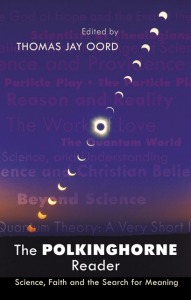Polkinghorne’s Open and Relational Path
I’ve been thinking about the various paths Christians take to embracing open and relational theology. John Polkinghorne is among those for whom science led to open and relational themes. For Polkinghorne and many other science and religion scholars, it makes sense to say an open and relational God creates an open and relational universe.
My thinking has been sparked by a book project I’ve just completed. The book is tentatively titled, The Uncontrolling Love of God (IVP Academic). I was helped by the Randomness and Providence grant program, headed by Jim Bradley.
John Polkinghorne came to open and relational theology primarily through his studies in science. After earning a PhD in physics at Cambridge University, Polkinghorne began a career in the sciences, writing his first book on particle physics. He worked with foremost scientists of his day and contributed to scientific research, specifically theoretical elementary particle physics. He also served as university lecturer in prominent universities in the United Kingdom.
Around the age of fifty, Polkinghorne decided to leave the laboratory and pursue ordination in the Church of England. “I simply felt that I had done my little bit for particle theory,” he said, “and the time had come to do something else.” In the decades that followed, he served as the dean and chaplain at Trinity Hall, Queens College, Cambridge, in addition to becoming a prolific author. As a leading voice among those who work to reconcile science and theology, he tried to “be two-eyed, looking with both the eye of science and with the eye of religion, and such binocular vision enables [him] to see more than would be possible with either eye on its own.”
Training in physics led Polkinghorne to approach the world in a particular way. As I noted earlier, physics suggests that events in our world are at least partly random and unpredictable. Twentieth-century science saw the death of mechanism as scientists discovered in nature widespread and intrinsic unpredictability. The subatomic level first revealed this, but intrinsic unpredictability also became evident at the everyday level of chaos theory.
Polkinghorne came to believe the randomness in the world tells us something true about the openness of reality itself. This belief stems from his commitment to philosophical realism, which says our observations tell us something true about the world. “Affirming that what we know or cannot know should be treated as a reliable guide to what is the case,” he explains. Or to put it more philosophically, “intelligibility is the reliable guide to ontology.”
Extrapolating from the scientific idea that observation tells us something true and from the theological idea that God works creatively in the world, Polkinghorne came to believe God faces an open future. “If I can act in this way in a world of becoming that is open to its future,” he says, “I see no reason to suppose that God, that world’s creator, cannot also act providentially in some analogous way within the course of its history.”
Consistent with open and relational theology, Polkinghorne says God is not a Cosmic Tyrant who does everything and allows no independent power to creatures. But neither is God a Deistic Spectator who just stands aside and lets it all happen. Instead, “the Christian God is the God of love who neither abandons creatures nor prevents them from being themselves and making themselves.”
God is not a Cosmic Tyrant who does everything and allows no independent power to creatures. Click To Tweet But neither is God a Deistic Spectator who just stands aside and lets it all happen. Click To TweetThe idea that creatures play a role in “making themselves” is partly Polkinghorne’s way of interpreting evolution theologically. “God interacts with creatures,” he says, but God “does not overrule the gift of due independence which they have been given.” Evolution requires contributions from both creatures and the Creator. The created order comes from God’s creating and creatures co-creating.
Polkinghorne is one of many contemporary thinkers who find kenotic theology satisfying. He believes “the creation of a world of real becoming” must have involved “not only a kenosis of divine power but also a kenosis of divine knowledge.” This means “even God does not yet know the unformed future, for it is not yet there to be known.”
God’s lack of foreknowledge signifies no imperfection in God’s nature. It only means God’s relation to time is similar to creation’s relation. “The eternal God, in bringing a temporal world into being,” says Polkinghorne, “has condescended also to engage with the reality of time.” Postulating both eternity and temporality in God’s nature, although in different respects, “has been an important ingredient in much contemporary theology.”
God’s lack of foreknowledge signifies no imperfection in God’s nature Click To TweetOpen relational theologies are well situated to accept the randomness many report in the world. They assume God is not all controlling and creation exhibits genuine causality. They also affirm with most of science that all causation is forward oriented. In open and relational theologies, the forward flow of time is a necessary feature of those things that actually exist. In other words, effects cannot precede their causes.
Polkinghorne has his own version of open and relational thought. But other scholars leading the science-and-theology conversation offer their versions of open and relational thinking. Open and relational scholars do not agree on all of the specifics, of course. The details of their visions of providence, for instance, differ depending on their interests, expertise, inclinations, and primary concerns.

Comments